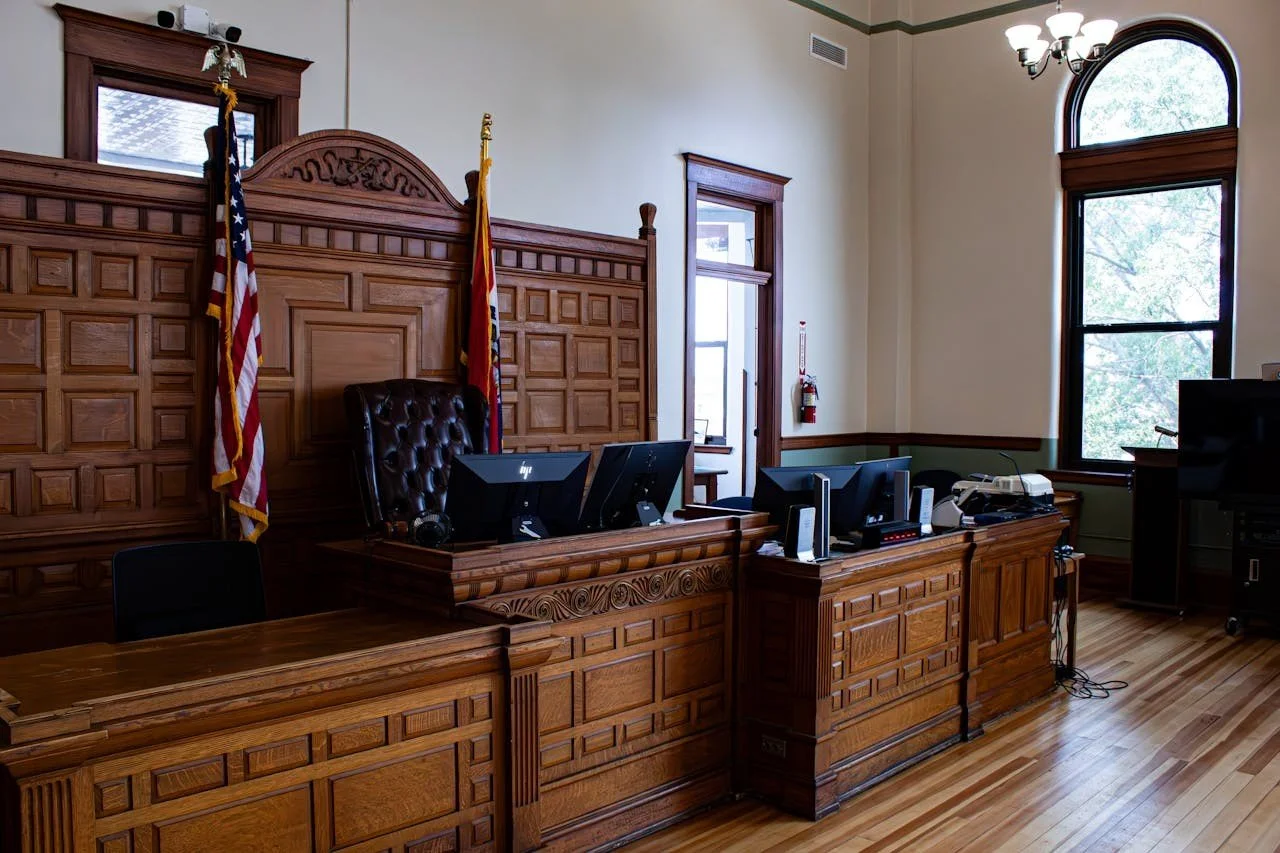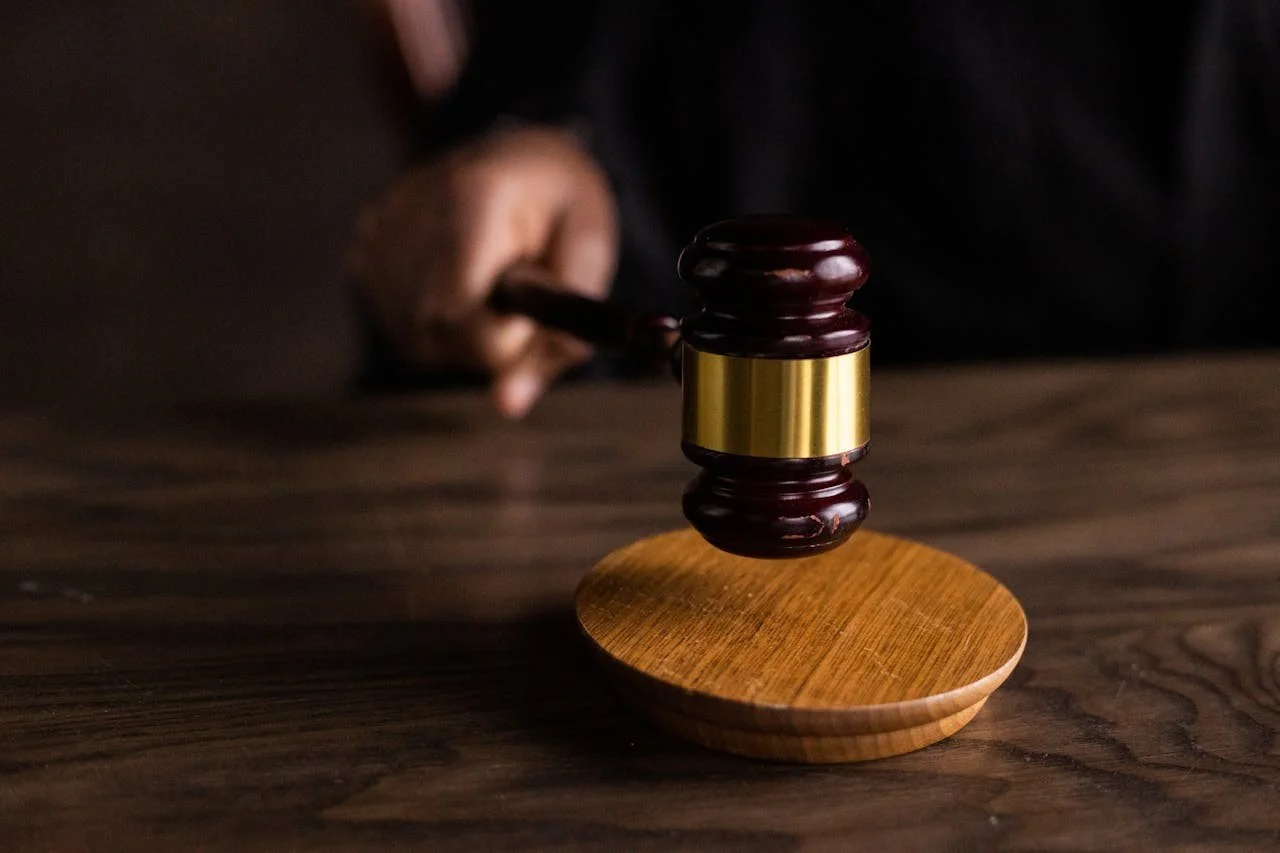Confidence in the Courtroom: How Mastering High-Pressure Moments Builds Unshakable Professional Confidence
Standing in the dingy Baltimore City courthouse, my heart was racing, and I was short of breath. Despite my federal clerkship and top law school ranking, confidence in the courtroom felt impossible as I prepared to face Baltimore City's most feared plaintiff's attorney in my first solo jury trial. The voice in my head was relentless: "You have no chance. You do not know what you are doing.”
That terrified young attorney eventually won that "impossible" case and discovered something that transformed four decades of practice: courtroom confidence isn't just about individual victories—it's the foundation for building unshakable professional confidence that elevates every aspect of your legal career. This guide reveals proven techniques for developing authentic confidence through mastering high-pressure legal situations, from physical presence mastery to advanced negotiation strategies that create lasting professional transformation.
The Hidden Costs of Lacking Confidence (And Why They're Devastating Your Practice)
Before we discuss building confidence, let's examine what happens when you don't have it. Understanding these hidden costs will motivate you to take action and show you precisely what's at stake in your professional life.
When Self-Doubt Becomes Your Biggest Opponent
Here's what nobody talks about in law school: the attorney sitting across from you isn't your biggest threat—the voice in your head is. I've watched brilliant lawyers sabotage their cases because they second-guessed their instincts at crucial moments. I've seen talented attorneys accept lowball settlements because they doubted their trial skills. I've witnessed promising careers stall because fear of failure prevented attorneys from taking on challenging cases.
The Opportunities You Never Take
When you lack confidence in legal practice, you become your own worst enemy. You don't raise your fees even though your work quality has improved dramatically. You decline partnership opportunities because you convince yourself you're 'not ready yet.' You refer cases to other attorneys instead of expanding your practice areas. You avoid networking events where you could meet potential clients or referral sources. These are just a few examples of how a lack of confidence can hold you back in your legal career.
The saddest part? Your clients suffer too. They get a cautious, hesitant advocate instead of the fierce champion they deserve. They sense your uncertainty and start questioning whether they made the right choice in selecting an attorney.
The Exhausting Cycle of Overcompensation
Lacking confidence creates a vicious cycle that drains your energy and joy from practicing law. You overwork in an attempt to prove your worth. You overprepare for simple matters because you lack confidence in your judgment. You say yes to every unreasonable client demand because you're afraid they'll leave. You take on more cases than you can handle because you doubt your ability to command higher fees.
This isn't sustainable, and deep down, you know it. The harder you work to mask your insecurity, the more exhausted you become. The more exhausted you are, the more mistakes you make. The more mistakes you make, the less confident you feel. It's a downward spiral that destroys careers and personal lives.
Why Generic Confidence Advice Fails Lawyers
Most confidence-building strategies ignore the unique pressures of legal practice. Positive thinking doesn't prepare you for hostile cross-examinations or aggressive opposing counsel. Legal confidence-building requires specific skills tailored to courtroom dynamics, client relations, and high-stakes negotiations that generic advice simply cannot address.
The Secret Of Courtroom Confidence Building
Understanding why confidence works the way it does will help you approach building it more strategically and give you the motivation to stick with the techniques even when they feel uncomfortable at first.
Understanding the Confidence-Performance Connection
Here's something fascinating: when you feel confident, your brain functions more effectively. You think more clearly, recall information faster, and make decisions with greater precision. When you're riddled with self-doubt, your brain goes into survival mode, making everything feel harder than it is. Understanding this connection can be a game-changer, relieving you of the burden of self-doubt and empowering you to perform at your best.
I experienced this firsthand during that Baltimore City case I mentioned earlier. Despite being brand new and facing an accomplished opposing counsel, something clicked when I stopped fighting my nervousness and started channeling it. My preparation felt sharper, my arguments flowed naturally, and I could read the jury's reactions more clearly.
The Compound Effect of Confidence in Legal Practice
Building confidence in legal practice fosters a positive, reinforcing feedback loop. Success in one high-pressure situation builds trust for the next challenge. This compound effect explains why some attorneys seem to effortlessly handle increasingly complex cases while others remain stuck in cycles of self-doubt despite years of experience. The more confident you become, the more success you achieve, and the more success you achieve, the more confident you become. It's a cycle that can propel your career forward.
Mastering Physical Presence for Courtroom Authority
Your body language is the foundation of confidence—it's the first thing people notice about you and the quickest way to change how both you and others perceive your authority and competence.
The Foundation of Professional Command
Let me tell you something that might surprise you: Juries decide whether to trust you within thirty seconds of seeing you walk into that courtroom. Before you've spoken a word about the law or presented a single piece of evidence, they've already formed an opinion based on how you carry yourself.
I learned this lesson during my federal court trucking cases, where sympathy naturally favored injured plaintiffs over corporate defendants. I realized that my physical presence could shift the entire dynamic of a case before I even opened my mouth.
The "I Belong Here" Stance
This might sound overly simple, but bear with me—it works. Plant your feet shoulder-width apart with your weight evenly distributed. Think of yourself as a tree with deep roots. This prevents that nervous swaying that screams 'I'm uncomfortable' to everyone watching. Keep your shoulders back but relaxed. You want to project confidence, not appear as though you're about to march in a military parade. Imagine someone gently pulling a string attached to the top of your head-this naturally aligns your spine and creates an aura of authority. This 'I Belong Here' stance can instantly boost your courtroom presence.
I've taught this technique to other attorneys, and the transformation is immediate. One lawyer told me, "I felt like I grew six inches overnight. Opposing counsel stopped interrupting me in depositions."
Strategic Eye Contact for Trust Building
Eye contact is your secret weapon for building instant rapport, but most attorneys do it wrong. They either avoid it completely (which makes them look evasive) or they stare, as if trying to hypnotize someone (which is just creepy).
Here's the technique that changed everything for me: when addressing a jury, imagine the jury box divided into three sections. Make eye contact with one person in each section for about 5-7 seconds, long enough to complete one thought. This creates the feeling that you're having individual conversations with real people, not performing for an audience.
When addressing judges, maintain eye contact for 3-5 seconds when making key points, then naturally glance at your notes or materials. This shows respect while maintaining your authority.
Voice Control Techniques for Maximum Impact
Your voice is an instrument, and like any instrument, it requires practice to master. I once won a case simply by lowering my voice during the most crucial moment of my closing argument. The entire jury leaned forward to hear me better, creating an intimacy that my opponent's shouting couldn't match.
Pace control is critical for confident legal communication. When we're nervous, we speak 20-30% faster than our normal rate. Force yourself to slow down by about 20% during essential arguments. It feels unnaturally slow to you, but to your audience, it sounds thoughtful and authoritative.
Advanced Courtroom Communication Strategies
Once you've mastered the physical foundations of confidence, it's time to focus on how you structure and deliver your arguments in ways that naturally project authority and persuade your audience.
The Three-Part Argument Architecture
After four decades of trials, I've learned that great arguments aren't just logical—they're architectural. They build systematically toward an inevitable conclusion. Every compelling presentation requires three key elements: a hook that captures attention, a bridge that connects to your client's situation, and a resolution that makes your conclusion feel inevitable.
During my sexual harassment defamation case, I didn't open with boring legal citations. I started with: "This case is about what happens when speaking the truth becomes dangerous in the workplace." That hook immediately engaged the jury and gave them a framework for understanding everything that followed.
Making Complex Legal Concepts Accessible
Here's my grandmother test: if your grandmother couldn't follow your argument, it's too complicated. I don't mean that juries aren't intelligent—they are. But clarity is persuasive, and confusion kills trust.
Use stories and analogies that connect legal concepts to everyday experiences. Instead of talking about "proximate cause," talk about the chain of events that led to the harm. Instead of discussing "burden of proof," explain what the jury needs to be convinced of and why.
Handling Unexpected Questions with Professional Grace
Every trial includes curveball moments—judges asking unexpected questions, surprise objections, witnesses giving answers you didn't anticipate. These moments separate confident attorneys from anxious ones.
I use what I call the STOP technique: Stop (don't rush to fill the silence), Think (consider your response), Organize (structure your answer), and Present (deliver with confidence).
When that judge asked me an unexpected question during my Baltimore City trial, I took a thoughtful pause before responding. That pause increased my credibility because it showed I was thinking, not just reacting.
Building Negotiation Confidence for Lasting Success
Negotiation skills are where confidence pays immediate dividends—every conversation, settlement discussion, and deal becomes an opportunity to build your confidence while achieving better outcomes for your clients.
Pre-Negotiation Preparation Strategies
The best negotiations are won before you walk into the room. Legal negotiation confidence comes from knowing exactly where you stand and what you're willing to accept.
Before any critical negotiation, I ask myself three questions:
What is the best possible outcome for my client?
What's the minimum I'll accept?
What happens if we walk away?
Having clear answers gives you something priceless—the genuine confidence to walk away. And when the other side senses you're genuinely prepared to leave, everything changes.
Reading Body Language and Micro-Expressions
People leak information constantly through their posture, gestures, and facial expressions. Learning to read these signals gives you a massive advantage in negotiations.
When someone crosses their arms and leans back after you make an offer, they're showing resistance. When they lean forward with their palms open, they're engaged and interested. I once settled a case for significantly more than expected because I noticed the opposing client nodding slightly at specific dollar amounts. Those tiny signals told me exactly where their comfort zone was.
Active Listening as Strategic Advantage
Most attorneys are so focused on making their points that they miss crucial information. Professional confidence for lawyers includes listening for what people don't explicitly say.
When someone says, "We could never accept less than X," I hear opportunity. The word "could" suggests flexibility. If they said "will never," that's different. These subtle distinctions can make or break a negotiation.
The Confidence Compound Effect in Legal Practice
Here's the most exciting part about building courtroom confidence—it doesn't stay contained to trial work. Still, it permeates every aspect of your practice, creating a positive transformation that impacts everything you do as a lawyer.
How Courtroom Skills Transform Your Entire Practice
Here's what nobody tells you about building confidence in legal practice: it doesn't stay in the courtroom. It follows you everywhere.
After mastering these techniques in trial settings, I noticed changes throughout my practice. Client meetings became easier because if you can handle skeptical juries, explaining strategies to clients feels natural. Business development became less intimidating because networking feels simple after facing aggressive opposing counsel. Fee discussions became straightforward because confidence in your abilities makes it easier to charge what you're worth.
Personal Transformation Through Professional Growth
The changes extend beyond professional skills. Building genuine confidence in high-stakes situations fundamentally changes how you see yourself as a lawyer and as a person.
I remember the exact moment I realized I'd truly transformed. I was facing a particularly hostile opposing counsel in a deposition—the kind who tries to intimidate through volume and aggression. Instead of feeling that familiar knot in my stomach, I felt curious. I was genuinely interested to see how his tactics would play out.
That shift from fear to curiosity marked a fundamental change in my relationship with practicing law. Challenges became puzzles to be solved rather than threats to be survived.
Common Confidence-Building Mistakes That Undermine Progress
Even well-intentioned attorneys can sabotage their confidence-building efforts by falling into these common traps—avoiding these mistakes will accelerate your progress and prevent discouraging setbacks.
Over-Preparation Paralysis
I learned this lesson the hard way: there's a sweet spot between being thoroughly prepared and being paralyzed by endless preparation. I once spent so much time perfecting my opening statement that I was exhausted before the trial even began.
Prepare systematically, then trust your preparation. Over-preparation doesn't eliminate anxiety—it often increases it.
Destructive Comparison Patterns
Attorney confidence-building requires focusing on your growth rather than constantly comparing yourself to colleagues. Every attorney has unique strengths, varying experience levels, and distinct natural abilities.
I used to torture myself watching other attorneys who seemed naturally confident. It took years to realize that everyone has their path to confidence, and comparing myself to others was just stealing my energy from actually building my skills.
Ignoring Physical Confidence Symptoms
Confidence building isn't just mental—it's physical. If you're not sleeping well, if your stomach is constantly in knots, if you're getting frequent headaches, these physical symptoms will undermine your mental confidence no matter how many techniques you learn.
Address the physical symptoms as seriously as you treat your case preparation. Both contribute equally to your professional effectiveness.
Putting It All Together: Your First Steps Forward
Now that you understand the theory and techniques, let's discuss how to implement these changes in your practice without overwhelming yourself or trying to transform everything at once.
Start with What Feels Natural
You don't need to transform overnight. Pick one technique from this guide that resonates with you and practice it consistently for a week. Maybe it's the "I belong here" stance, or the strategic pause technique, or simply slowing down your speech during essential conversations.
The key is consistency over perfection. Small, daily improvements compound into dramatic transformations over time.
Build on Early Wins
Once you've mastered one technique and seen positive results, add another. This gradual approach prevents overwhelm and allows you to integrate each skill thoroughly before moving to the next.
I've watched attorneys transform their entire practice by implementing just two or three of these techniques consistently. You don't need to master everything—you need to master the skills that work best for your personality and practice style.
Trust the Process
Building confidence in legal practice takes time, but the results are worth the effort. Every small win builds toward the larger transformation. Every successful application of these techniques strengthens your belief in your capabilities.
Remember, you already have the foundation—your legal education, your experience, your dedication to your clients. These techniques simply help you access and project the competence you already possess.
Conclusion: Your Journey from Uncertainty to Unshakable Confidence
That anxious young attorney staring at his reflection in the Baltimore City courthouse bathroom eventually transformed into someone who could enter any courtroom feeling genuinely excited about the challenge ahead. This transformation didn't happen by eliminating nervousness—it happened by learning to channel that energy into focused, powerful performance.
Building confidence in legal practice isn't about becoming someone you're not. It's about becoming the best version of who you already are. The techniques I've shared aren't magic tricks—they're practical skills that compound over time to create authentic confidence based on proven competence.
When you master these skills, something beautiful happens: you stop pretending to be confident and start embodying it. You serve your clients better because you're thinking, rather than second-guessing yourself. You enjoy practicing law more because challenges become interesting puzzles rather than threats to survive.
You've earned your place in this profession through education, hard work, and dedication. These confidence-building techniques will help you embody that truth and transform not only your legal practice but also your entire relationship with being a lawyer.
The courtroom is your arena. These high-pressure moments are your opportunities to build the unshakable confidence that will elevate every aspect of your legal career.







